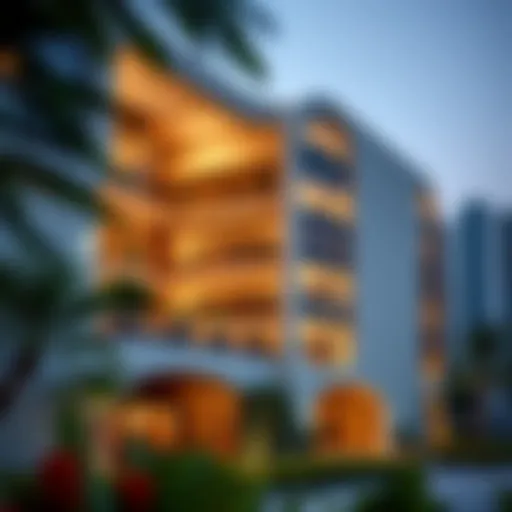Ramadan 2024 Time Table in the UAE: A Detailed Guide


Intro
As the sun sets and the crescent moon appears, countless Muslims across the globe prepare to observe a month steeped in spirituality, reflection, and community. Ramadan, a significant period in the Islamic calendar, holds unique meaning in the United Arab Emirates, a nation known for its rich tapestry of cultures and traditions. As we look ahead to Ramadan 2024, understanding the time table and implications of this revered month is essential for both locals and expatriates alike.
In the UAE, various aspects of daily life transform during Ramadan — from fasting schedules to communal prayers and cultural festivities. This comprehensive overview aims to guide readers on what to expect in terms of fasting hours, prayer times, and other relevant activities tailored to enhance the experience of the holy month.
In this piece, we will delve into the modes of observance that characterize Ramadan in the UAE. We aim to provide a detailed look at the significance of this month, informed predictions, and practical insights that will resonate with everyone caught up in the spirit of these 30 days. The month is not just a personal journey; it’s also a time when communities come together to celebrate shared values and traditions. Therefore, understanding the entire scope of Ramadan in the UAE is akin to unlocking a treasure chest of communal and spiritual wealth.
Preamble to Ramadan
Ramadan holds a significant place in the hearts of millions of Muslims around the world, serving not just as a time of fasting, but as a period rich in reflection, community, and spiritual growth. This article details the essence of Ramadan, particularly in the context of the United Arab Emirates, emphasizing how this sacred month intertwines with various aspects of daily life. Understanding Ramadan's traditions and principles is crucial for investors, home buyers, real estate agents, property managers, and renters, as it influences not only social interactions but also market dynamics during this time.
Historical Background
The roots of Ramadan trace deep into history, harking back to the era of the Prophet Muhammad in the early 7th century. It is believed that Ramadan, the ninth month of the Islamic lunar calendar, was first observed as a month of divine revelation. The Quran reveals that this month is when the holy book was sent down to guide humanity.
Over the centuries, Ramadan has evolved, embracing various cultural influences, particularly in diverse regions like the UAE. Here, the month is steeped in rich traditions that blend both historic Islamic practices and local customs, making it a unique period of observance. The communal aspect of Ramadan has remained a constant, signifying unity among Muslims, regardless of their backgrounds.
The importance of this history resonates today, reminding the community of the values of patience, self-discipline, and empathy rooted in these ancient practices, which have stood the test of time.
Significance in Islam
Ramadan is far more than abstaining from food and drink during daylight hours; it epitomizes the very essence of spiritual purification. It is viewed as a time for Muslims to connect deeply with their faith, engage in prayer, and increase their devotion. The significance of fasting during this month is underscored by the injunction found in the Quran: "O you who have believed, decreed upon you is fasting as it was decreed upon those before you that you may become righteous" (Al-Baqarah 2:183).
Fasting involves a holistic approach—keeping oneself away from not just physical sustenance but also negative behaviors, fostering a sense of community through shared experiences during Iftar (the evening meal to break the fast). Consequently, Ramadan has a profound impact on spiritual growth, prompting introspection and enhancing compassion towards those less fortunate.
Moreover, this month cultivates social bonds, promoting acts of charity and community support. In the UAE, these practices are amplified, leading to various outreach programs that reflect the true spirit of giving. These elements combine to enrich the social fabric and uphold the principles of compassion that are paramount in Islam.
"Ramadan is not just a month of fasting; it is the time to realign with one's faith, foster bonds, and develop inner peace."
Overview of the Holy Month
The month of Ramadan holds a special place within the Islamic tradition. As believers embark on this sacred journey, the significance of the holy month transcends mere abstinence from food and drink; it helps to foster a unique blend of spirituality, community bonding, and self-discipline. Ramadan serves not only as a time for fasting but also as a period for collective reflection, allowing individuals to deepen their faith while connecting with others in their community. This overview highlights some of the hallmarks that make Ramadan particularly impactful in the UAE and around the world.
Spiritual Aspects
At the heart of Ramadan lies a spiritual awakening that can be profoundly transformative. Each day begins with Fajr, the pre-dawn prayer, and culminates with the evening meal known as Iftar. During these hours of fasting, individuals strive to purge the body of excess and focus on prayer, introspection, and charitable acts. Before the sun rises, many engage in personal reflection, reading the Quran, and even praying for specific intentions or challenges in their lives.
The opportunity for personal growth during this month is immense, shaping one’s character and enhancing connectivity with one's faith. Yet, it’s not just about self-discipline; Ramadan invites communal harmony. Families often gather to break fast together, creating a special atmosphere that transcends the daily hustle and bustle.
"Fasting is a shield; it protects the believer from the fire and serves as a reminder of the trials faced by those less fortunate."
The observance of Ramadan encourages self-discipline, empathy, and awareness of those who are often overlooked in daily life. Overall, the spiritual aspects create a tapestry of faith that lays the groundwork for deeper connections with God and those around us.
Community Engagement
While Ramadan is an individual journey of faith, its essence is amplified through community engagement. The practice of fasting creates a sense of unity as families, friends, and neighbors come together to support one another. Iftar gatherings can be large or small, formal or intimate, and they often become events of joyful exchange where people share food, stories, and prayers.
During this month, mosques become vibrant hubs of activity. Many communities organize evening prayers known as Taraweeh, where families gather not just to pray but also to connect and reinforce their social ties. Furthermore, various charitable organizations ramp up efforts to aid those in need, demonstrating the strong link between faith and philanthropy.
Local businesses also engage by offering specially curated Iftar menus and discounts, fostering a sense of community spirit that resonates throughout the month. Overall, the social fabric is woven tighter through acts of kindness, collective worship, and a shared commitment to supporting those in need.
In essence, the overview of the holy month captures the multidimensional experience of Ramadan. It’s not just a time of physical fasting; it encapsulates spiritual growth and community bonding, enriching the lives of countless individuals in the UAE and beyond.
Ramadan Specific Dates
The specific dates of Ramadan hold substantial significance, marking a sacred time of fasting, prayer, and reflection for millions of Muslims around the world. In the context of the UAE, understanding these dates is not just about knowing when to begin and end fasting; it affects daily life, planning for communal iftar gatherings, and scheduling business hours. As Ramadan approaches, anticipation builds in communities, and aligning social calendars becomes crucial. Moreover, accurate knowledge of these dates ensures that everyone can partake in spiritual practices while seamlessly blending cultural observances with personal routines.
Start and End Dates
Ramadan in 2024 is expected to commence on the evening of Sunday, March 10, aligning with the sighting of the crescent moon. The exact timing may vary slightly based on local lunar observation, which can affect the start date across different regions within the UAE. Generally, the month will conclude with Eid al-Fitr around Tuesday, April 9. This festive holiday, marking the end of fasting, is a time of significant celebration, as families come together to break fast and share meals in joyous gatherings.
Description of Adjustments
During Ramadan, several adjustments resonate throughout daily life in the UAE. For one, business hours are often modified to accommodate fasting schedules, with many offices opening later in the day and closing earlier in the evening. This adjustment provides flexibility for workers during fasting hours. Public services, too, strive to function efficiently while respecting the cultural and spiritual essence of the holy month.
It’s worth noting that while individuals are expected to refrain from eating and drinking from dawn until sunset, the rhythm of daily life takes on a unique cadence. Conversations tend to focus on preparation for iftar and sehri, the meals before dawn, where families gather for heartwarming moments.
As the month progresses, mosques play a pivotal role in ensuring the community remains engaged. They often arrange special events and educational programs that encourage collective worship. In addition, local businesses, especially restaurants, shift their offerings to serve traditional Ramadan delicacies during iftar.
"The essence of Ramadan is not merely in abstaining from food and drink; it encompasses a broader journey towards increased piety, community bonding, and charitable actions."
Overall, the specific dates and adjustments during Ramadan in the UAE underscore a profound commitment to spiritual observance, intertwined with cultural values and community support, creating a deeply engaging atmosphere throughout the month.
Prayer Timings
Understanding prayer timings during Ramadan is crucial for the Muslim community as it structures the rhythm of the day and fosters spiritual devotion. This section explores both Fajr and Maghrib prayer schedules, their implications, and outlines key considerations for personal practice during this holy month.
Fajr and Maghrib Prayer Schedules
Fajr marks the beginning of the fast each day during Ramadan, and Maghrib signals the end of it. The precise timings for these prayers can vary slightly depending on geographical location and sometimes local traditions. In the UAE for 2024, these timings are generally listed as follows:
- Fajr: Usually follows the calculation based on astronomical data and is typically between 4:30 AM to 5:00 AM.
- Maghrib: This prayer is performed immediately following sunset, which can be around 6:30 PM to 7:00 PM.
These timings can be accessed through local mosques or community centers, ensuring that individuals can find the right times for fasting and prayers.
"Knowing the prayer times isn't just about following schedules; it's a way of connecting deeper with faith and understanding the nuances of Ramadan."
It's essential to note that while some communities might make small adjustments, official channels often provide the most reliable timing. Some modern mobile applications and websites are also available, which offer real-time updates based on location.


Limitations and Considerations
There are several aspects to contemplate regarding prayer timings during Ramadan:
- Variability Across Regions: Due to geographical differences, even in a small area like the UAE, the timings may vary slightly. It's advisable to consult local communities for any adjustments.
- Health and Wellness: For those fasting, it's essential to stay hydrated and maintain balanced nutrition. Ensure one eats balanced meals during Iftar and Suhoor, as these meals will support physical well-being for the day ahead.
- Professional Life: Many businesses in the UAE adapt their working hours to respect prayer timings. It’s common for offices to shift their schedules to allow employees to break their fast and observe prayers comfortably.
In the end, being mindful of Fajr and Maghrib prayer schedules is pivotal for spiritual and community engagement during Ramadan. This careful planning not only enhances personal devotion but contributes to a collective spirit during this holy month.
Fasting Guidelines
Fasting during Ramadan is not merely a ritualistic practice; it's a deeply woven element of spirituality and solidarity among Muslims. This section delves into the intricacies of fasting, highlighting not only its significance but also key health considerations and exemptions that are vital for a well-rounded understanding.
Health Considerations
Fasting can be a double-edged sword when it comes to health. On one side, it’s a method of spiritual cleansing and self-discipline; on the other, it requires awareness about physical well-being. During Ramadan, observing fast from dawn until sunset means forgoing food and drink during daylight hours. This abstention can lead to various health impacts, both positive and negative.
For instance, many people experience improved mental clarity and emotional stability as they engage in prayer and reflection. Yet, dehydration and fatigue can also set in, especially in the sweltering heat of the UAE.
To navigate these waters, consider the following health tips:
- Stay Hydrated: Consume ample water during non-fasting hours. Avoid caffeinated drinks, as they can lead to increased dehydration.
- Nutritional Balance: Focus on a balanced diet at Iftar and Sehri, incorporating whole grains, lean proteins, and an abundance of fruits and vegetables.
- Listen to Your Body: If exhaustion sets in, take rest breaks. Your body communicates; learning to listen can make all the difference.
"The greatness of a nation and its moral progress can be judged by the way its animals are treated."
- Mahatma Gandhi
These simple yet effective measures create a bridge between fasting practices and health management during Ramadan.
Exemptions from Fasting
Understanding exemptions from fasting is crucial as it provides clarity on who is required to fast and who is not. The Quran acknowledges that certain individuals may be unable to partake in fasting due to various circumstances. Here are key groups recognized as exempt:
- Sick Individuals: Those suffering from a chronic illness or acute health conditions that could worsen due to fasting are exempt. Health takes precedence.
- Pregnant and Nursing Women: Women in these conditions may require additional nutrition, making fasting a challenge without proper dietary support.
- Travelers: Those away from their usual residing place may also be excused, as travel can impose additional difficulties.
- Children: Generally, fasting is not obligatory until the age of maturity, which is commonly around fourteen years.
In cases where fasting is missed due to legitimate reasons, the individual is often encouraged to make up missed days later, provided it’s feasible, or offer compensatory fasting if that’s applicable.
By understanding these exemptions, one can appreciate the flexibility within Islamic teachings, emphasizing the importance of health and well-being. This balance ensures that the sacredness of Ramadan is preserved, all while accommodating genuine needs.
Cultural Practices during Ramadan
The cultural practices during Ramadan form an integral part of the observance of this holy month in the UAE. They not only enhance the spiritual experience of fasting and prayer but also foster a strong sense of community and social unity among individuals of all backgrounds. These practices serve to enrich the month with traditional values while also adapting to contemporary societal norms. It allows the diverse populace of the UAE to embody the core tenets of Islam while simultaneously promoting cultural inclusivity.
Iftar Traditions
Iftar, the meal to break the fast, is a deeply cherished event marking the end of a day spent fasting from dawn until sunset. Families, friends, and communities come together, sharing food that often features traditional dishes unique to the region. Dates and water commonly herald the iftar meal.
In many households and restaurants, buffet-style iftar meals are an expected offering. During Ramadan 2024, popular spots such as Al Fanar Restaurant, known for its Emirati cuisine, and other local eateries will likely put forth elaborate spread inspired by regional flavors.
- Cultural Significance:
- Health Considerations:
It's crucial to approach iftar with thoughtfulness. Overeating after a day without food can lead to discomfort or health issues. Traditional cuisine, rich in flavors and spices, can easily tip from celebratory to overwhelming if not moderated.
A balanced meal that includes a healthy ratio of carbohydrates, proteins, and vegetables is essential amidst all the delicious options.
- Iftar isn't just about food; it’s about gathering together, fostering connections, and often throwing open the doors to neighbors and even strangers.
- Public iftar tents are sprouting up, providing free meals to anyone in the community, showcasing the spirit of sharing and charity that epitomizes Ramadan.
Sehri Practices
Sehri, the pre-dawn meal, plays a pivotal role in the fasting regimen. It is consumed before the Fajr prayer and before the fast begins for the day. This meal can set the tone for how one will fare throughout the day.
- Food Choices:
- Calm and Reflective Environment:
- Practical Timing:
As the timing of sehri is dictated by the ability to eat before the Fajr prayer, planning is essential. In the UAE, where the days can get long during Ramadan 2024, utilizing mobile apps or local announcements regarding prayer times can ensure that individuals have enough time to enjoy their meals undisturbed.
- The selection of food during sehri tends to be hearty. Items like oatmeal, eggs, bread, yogurt, and plenty of water are common, offering both sustenance and hydration needed for the day ahead.
- More than just the food, the atmosphere during sehri can lean towards quiet and contemplative. Families often gather for prayer before the day’s fast begins, making it a spiritual start to a day that will be filled with devotion and reflection.
As we see, these cultural practices shape the overall Ramadan experience in significant ways. They are not just routines; they are expressions of faith, community ties, and a profound respect for tradition. In addition, adjusting to these practices encourages mindfulness and connection amidst the broader activities of this holy month.
Social Responsibilities
During Ramadan, the essence of community and social responsibility comes to the forefront, reminding individuals of their roles beyond personal fasting and prayer. The holy month is about more than just abstaining from food and drink; it’s a time of compassion, reflection, and active engagement in uplifting those around us. In the UAE, the cultural fabric deeply interwoven with Islamic values emphasizes charity and support for one another.
One of the most significant aspects of social responsibility during this time is acts of charity. It’s common for individuals and corporations alike to partake in various charitable initiatives, recognizing that sharing one’s blessings with those in need is a fundamental tenet of Islam. Charity transcends mere financial contributions; it encompasses volunteering time, sharing knowledge, and extending kindness.
Additionally, several studies show that acts of charity during Ramadan not only assist the needy but also foster a sense of belonging and community spirit. For example, putting together food drives or organizing community iftars—where people break their fast together—can build strong bonds among diverse groups. The act of sharing a meal becomes symbolic of solidarity and mutual respect.
Furthermore, Ramadan is not just a personal journey but a collective experience that allows for community support initiatives. Various organizations, NGOs, and even local businesses ramp up efforts to sponsor events that focus on community engagement. This may involve organizing workshops on financial literacy, health clinics, or cultural exhibitions that highlight the values and traditions of Ramadan.
"When everyone pitches in, acts of kindness multiply, and the spirit of Ramadan truly shines."
Moreover, the UAE government often collaborates with local entities to promote social welfare activities. Such partnerships ensure that a wide array of community programs are available, catering to various demographics, from expatriates to long-term residents. Volunteering opportunities, such as distributing meals to laborers, are especially prevalent.
Key Benefits of Social Responsibility During Ramadan:
- Building Stronger Communities: Engaging in collective acts of charity strengthens social ties and fosters community cohesion.
- Promoting Empathy and Understanding: Participants in charitable acts gain deeper awareness of societal issues, leading to enriched perspectives on collective well-being.
- Enhancing Mental Well-being: Helping others has been shown to contribute positively to one's mental health, resulting in a fulfilling experience for both givers and receivers.
In summary, the social responsibilities observed during Ramadan in the UAE highlight an unwavering commitment to fostering a caring and supportive environment. It serves as a reminder that Ramadan is indeed about strengthening ties, not just with family and friends, but also with the broader community. As 2024 approaches, the spirit of giving and social collaboration remains as pertinent as ever.
Impact on Daily Life
During Ramadan, the effects extend beyond mere fasting; it encompasses a broad spectrum of daily life adjustments within the UAE. This period is not just about refraining from food and drink, but also about embracing a collective spirit that impacts work, social gatherings, and community involvement. Understanding these changes is crucial for anyone living or working in the UAE, from investors to renters, as it underscores the significance of cultural practices in shaping daily life.
Adjustments in Work Schedules
As Ramadan approaches, many businesses in the UAE adapt their work schedules to align with the fasting hours. This can mean shorter working hours, typically reduced from the standard eight to six hours per day, to accommodate employees observing the fast. Employers often show flexibility, allowing employees to adjust starting times so they can complete their work while respecting their spiritual obligations.


In fact, many organizations implement a shift system, where employees can choose their working hours to best suit their individual routines.
Additionally, many sectors—particularly those involving client-facing roles—might shift their peak hours to accommodate after Iftar gatherings. This cultural shift encourages a focus on community and connectivity, offering businesses an opportunity to strengthen relationships through shared meals and evening activities.
It is important for organizations to communicate clearly about their specific policies during this month, as glitches in hours can create confusion. Understanding these changes can help real estate agents and property managers ensure that their tenants and clients feel supported during this unique time.
Changes in Public Activities
Public activities also see significant transformation during Ramadan. Many leisure activities, including parks, movie theatres, and shopping malls, adjust their hours or offerings. They open later in the evening, often offering special events, entertainment, and promotional activities post-Iftar to attract night-time visitors.
Local communities often host evening markets or Ramadan tents, creating vibrant social hubs. These events not only promote cultural engagement but also present business opportunities for local vendors and entertainers. They enrich life by offering varied experiences, from shopping to cultural exhibits, all tailored to the festive spirit of the month.
In more residential areas, families come together in parks and communal spaces for large Iftar gatherings, showcasing a profound sense of community. Real estate professionals might observe shifts in demand, as areas with vibrant community activities might become more appealing to renters and investors alike.
Prominent local events often see greater participation during Ramadan, such as cultural exhibitions at the Sheikh Mohammed Centre for Cultural Understanding. These events promote intercultural dialogue and provide a platform for understanding the essence of Ramadan.
Business Adaptations
During Ramadan, the business landscape in the UAE undergoes significant transformations to align with the cultural and spiritual observances of this holy month. It is crucial for businesses to adapt not just in terms of operational hours but also in how they engage with customers and employees. Understanding these adaptations is essential for fostering an environment that respects tradition while maintaining economic vibrancy.
Restaurant Hours and Offerings
Food establishments face unique challenges and opportunities during Ramadan. Traditional guidelines dictate that restaurants remain closed during daylight hours, catering to the needs of fasting individuals. However, many businesses adapt by extending their hours after sunset, creating vibrant iftar experiences marked by communal meals.
- Extended Operating Hours: Following Maghrib prayers, restaurants often remain open late into the night to accommodate diners breaking their fast. This is where establishments can capitalize on increased foot traffic, offering diverse menus that cater to various tastes and preferences.
- Special Menus: Many restaurants craft special iftar menus that feature traditional cuisines along with modern culinary twists. For example, places like Al Fanar Restaurant serve Arabic breakfast items, alongside contemporary dishes to attract a wider audience. Special deals and promotions can entice customers and generate buzz.
- Cultural Themes: Themed nights can be an attractive proposition. For instance, a restaurant might host a Middle Eastern night with belly dancing and traditional music, immersing diners into the rich cultural experience of Ramadan itself.
Retail Sector Adjustments
The retail sector also undergoes considerable changes to meet the unique demands of Ramadan shoppers. As people prepare for fasting and celebrations, retailers must adapt their strategies to optimize customer experience.
- Altered Store Hours: Many shops adjust their opening hours to operate later in the day. This allows customers to shop conveniently post-iftaar, ensuring that consumers have access to their stores when they are most likely to shop. Some stores may stay open well past midnight to cater to night owls.
- Promotions and Sales: To attract shoppers, retailers often roll out Ramadan-specific discounts and incentives. This includes bundle offers that encourage larger purchases, particularly for items commonly used during the month, such as dates and sweets.
- Community Engagement: Retailers may also engage with the community through charitable initiatives, such as donating a portion of sales to local charities. Such actions not only enhance brand loyalty but also align with the spirit of giving that Ramadan embodies.
In summary, business adaptations during Ramadan are more than operational pivots; they reflect a profound understanding of cultural values and economic needs. These changes not only enrich the customer experience but also solidify the relationship between businesses and the communities they serve. By leveraging the unique opportunities this month offers, businesses can forge stronger connections with their customers.
Ramadan Events and Activities
The month of Ramadan in the UAE is not merely a time for fasting; it’s also a period rich with customs and events that weave the fabric of community life. With vibrant activities during this holy month, the sense of togetherness elevates the communal spirit, drawing individuals into meaningful gatherings and celebrations. Whether one’s connections are spiritual, social, or cultural, these events resonate deeply with the sentiments of generosity and unity that Ramadan fosters.
Public Festivities
Public festivities during Ramadan are a dazzling showcase of cultural pride and social unity. Cities across the UAE, particularly in Dubai and Abu Dhabi, transform into hubs of activity. Streets are adorned with colorful lights, and decorations reflecting traditional Islamic art set a festive mood. Events like Ramadan bazaars and night markets spring up, where families and friends gather to enjoy mouth-watering street food.
The Ramadan Night Market is just one example where visitors can indulge in everything from local delicacies to international cuisines.
"Community bonds grow stronger through shared experiences in the spirit of Ramadan."
Numerous communities organize Iftar events open to everyone. These gatherings promote a sense of belonging, making it a nurturing environment for both locals and visitors alike. Live music, cultural performances, and storytelling sessions enhance the experience, educating participants about the significance of Ramadan while providing entertainment.
Moreover, you can find various family-friendly activities or workshops aimed at fostering a deeper understanding of Islamic culture and spirituality. Parents often bring their children to participate in art sessions or charity drives, blending learning with fun.
Cultural Exhibitions
Cultural exhibitions hold particular significance during Ramadan, serving as an opportunity to showcase Islamic heritage and the traditions surrounding the holy month. Many institutions and art galleries organize exhibitions to highlight the creativity and contributions of Muslim artists.
These exhibitions often include interactive elements, such as traditional calligraphy workshops, where the intricate art form mans its beauty, attracting both enthusiasts and the curious. By bridging modernity with tradition, these events present a profound narrative of the Islamic world, allowing participants to appreciate its richness.
Additionally, various museums, like the Louvre Abu Dhabi, feature special Ramadan exhibits focusing on the relationship between art, history, and faith. These showcase the essential principles of compassion, peace, and community that resonate during Ramadan.
Visitors leave with a renewed sense of respect for Islamic values and culture, understanding how these practices influence daily life in the UAE.
The cultural exhibitions and public festivities during Ramadan do more than just entertain; they serve to enlighten participants, strengthening communal ties and nurturing intercultural dialogue. It's essential to consider these aspects when experiencing Ramadan in the UAE, as they contribute significantly to what defines this remarkable month.
Role of Mosques
The role of mosques during Ramadan extends beyond being mere places of worship; they serve as community hubs that foster a sense of belonging and unity among Muslims. Particularly in the UAE, mosques during this holy month are like beacons of spiritual guidance and connectivity. They facilitate various activities that not only enrich the faith of individuals but also bind families and communities together. Understanding the significance of mosques can illuminate their value during Ramadan and beyond.
Community Gatherings
Mosques provide essential platforms for community gatherings, especially during Ramadan. These spaces are where individuals come together to break their fast. The iftar meals, typically held in mosques, are open to all, regardless of their background. This inclusivity greatly enhances communal ties.
- Sharing the Iftar: Iftar is a time where the community gathers to break fast together. Each mosque often organizes meals, allowing everyone to enjoy the evening meal in solidarity.
- Engagement in Prayers: The communal prayers, especially during the evenings called Tarawih, see a spike in participation. This fosters a communal spirit, as families and friends join their neighbors in prayer.
- Encouraging Inclusivity: This is a unique feature in mosques during Ramadan, allowing those who may feel isolated to connect with others who share similar beliefs. Such gatherings can make newcomers feel welcomed and involved in a larger family.
The gatherings also reflect a profound culture of sharing, which is central to Ramadan. The act of breaking fast becomes a communal affair, serving as a reminder of the significance of togetherness in the faith.
Educational Programs
In addition to providing space for worship and community interaction, mosques also play a pivotal role in educational programs during Ramadan. These include lectures, discussions, and classes aimed at enhancing religious knowledge and understanding.
- Teaching Quranic Recitation: Many mosques offer classes focused on the recitation and understanding of the Quran. Such programs are particularly popular during Ramadan, as many aim to complete a reading of the Quran during the month.
- Workshops on Islamic Values: These sessions focus on ethics, compassion, and charity, steering conversations toward improving not just spiritual practices but also social responsibility. This aspect is critical, as it aligns with the ethos of Ramadan which emphasizes generosity and giving.
- Youth Engagement: Specialized programs aim to engage younger audiences, teaching them about their faith in a digestible way that resonates with their daily lives. Such educational efforts ensure the continuity of Islamic teachings among future generations.
In summary, mosques during Ramadan are not just worship places; they are vibrant centers for community bonding and education. The activities held therein have a lasting impact on individuals and families, strengthening communal ties and enriching the spiritual lives of participants, ultimately promoting a deeper understanding of Islam.
The communal and educational roles that mosques play during Ramadan highlight their importance in the fabric of UAE society. They serve as more than just places to pray; they embody a rich tradition of community support and spiritual growth. As we contemplate the significance of Ramadan, recognizing the multifaceted role of mosques in this sacred month is essential.
Challenges Faced During Ramadan
The Holy Month of Ramadan is a significant period for Muslims, yet it is not devoid of its challenges. Understanding these issues is crucial for both individuals observing the fast and the wider community supporting them. Some challenges may not be apparent to those outside the Islamic faith, but they are very real for those participating in the practices of Ramadan.
Health and Well-being Issues


Fasting from dawn until sunset comes with its own set of health-related challenges. Some people experience fatigue, headaches, and, in some cases, dehydration. This is particularly true for those who are not adequately prepared for the fasting period.
To mitigate these health concerns, individuals should prioritize hydration during non-fasting hours. It's essential to consume nutrient-dense meals during suhoor (the pre-dawn meal) and iftar (the meal to break the fast) that provide enough energy and sustenance.
"Hydration is crucial, but so is balance in your diet. Eating foods rich in fiber, proteins, and healthy fats can make a world of difference."
Here are some health tips for a smoother fasting experience:
- Hydrate: Aim to drink water between iftar and suhoor to replenish fluids lost during the day.
- Opt for nutritious foods: Include complex carbohydrates and lean proteins that release energy slowly.
- Avoid excessive caffeine: Cutting back on caffeine can reduce the chances of headaches and jitters.
Maintaining Productivity
Another challenge that comes with Ramadan is the impact on productivity, especially in workplaces. Adapting to new schedules, managing energy levels, and maintaining focus can be daunting. Employees may find themselves struggling to meet their usual performance benchmarks, particularly in the first few days of fasting.
Employers can play an essential role here by being accommodating. Adjusted work hours or providing flexible schedules can significantly lighten the load for those observing Ramadan. This not only supports the employees but can enhance overall productivity, as individuals feel understood and valued.
Here are some recommendations for enhancing productivity during Ramadan:
- Flexible Working Hours: Allow employees to start and finish work at different times to accommodate fasting.
- Breaks: Encourage short breaks for a quick refresh, which can recharge and refocus attention.
- Task Prioritization: Focusing on high-priority tasks when energy levels are at their peak is a safe bet.
In essence, while the challenges of Ramadan can seem daunting, they can also serve as opportunities for growth and adaptation. By fostering an environment that embraces these challenges, both individuals and organizations can navigate this holy month with grace, compassion, and understanding.
Post-Ramadan Reflections
Reflecting on Ramadan brings clarity to the benefits reaped during this significant month. It's a time when Muslims engage deeply with their spirituality and their community. Post-Ramadan reflections help to assess how individuals have adapted their lives in the month and what lasting changes can be made to maintain that spirit year-round.
Spiritual Growth
The essence of Ramadan is spiritual development. During this holy month, fasting is not merely a physical restraint but a path toward enlightenment. The practice encourages self-discipline, prompting individuals to focus on prayer, introspection, and purifying their hearts.
Once Ramadan concludes, many find the lessons learned continue to resonate. For instance, a heightened sense of gratitude can pervade everyday actions. Members of the community often share stories of the humility experienced during fasting — a poignant reminder of the basic necessities many often take for granted. Moreover, the practice of frequent prayer can evoke a renewed dedication to spirituality. Individuals might find themselves setting aside time for daily prayers beyond Ramadan, incorporating that connection to their daily routine.
Continuous Community Support
Furthermore, Ramadan emphasizes communal ties and support. The tradition of sharing meals, especially during Iftar, cements bonds that might otherwise weaken throughout the year. Post-Ramadan, one of the important aspects becomes sustaining these connections.
Communities often start initiatives to continue the momentum of giving and support. Many may choose to engage with or establish volunteer programs or create ongoing charity initiatives. This continuous dedication to community well-being can provide lasting benefits for all involved.
"Community is like a fabric; its strength lies in how well its threads hold together."
These moments of collaboration can initiate projects that tackle local issues, promoting a sense of togetherness even in trying times. Residents might find themselves participating in clean-up activities, educational outreach programs, or even fundraising events for those in need.
Resources for Further Information
The importance of accessing reliable resources cannot be overstated, especially during Ramadan, when many seek to deepen their understanding and enhance their practices. In this article, we aim to equip readers with comprehensive guidance and vital information. There are two main avenues for this:
- Official Islamic Authorities
- Local Community Websites
By tapping into these resources, individuals can gain insights directly from credible sources, ensuring that their practices align with the teachings of Islam.
Official Islamic Authorities
Official Islamic authorities serve as the cornerstone for guidance on religious matters, particularly during Ramadan. In the UAE, entities like the General Authority of Islamic Affairs and Endowments play a pivotal role. They not only provide the accurate timing of prayers but also clarify the rules regarding fasting and the spiritual importance of the month.
Key benefits of relying on official authorities include:
- Accurate Information: Access timely updates regarding any changes in prayer times or announcements related to Ramadan.
- Guidance on Practices: Find essential insights about fasting rules and religious obligations, ensuring followers adhere to Islamic teachings.
- Educational Support: Participate in community webinars or lectures organized during Ramadan, which are often facilitated by these authorities.
Therefore, referring to the General Authority of Islamic Affairs and Endowments (gais.gov.ae) or other official religious websites can provide individuals with the necessary tools and knowledge to navigate this sacred month effectively.
Local Community Websites
In addition to official Islamic authorities, local community websites serve as a valuable resource, providing grassroots insights and information that may not be found in official publications. Many UAE mosques and community centers maintain websites or social media pages to share updates on events, prayer times, and local Ramadan initiatives.
The advantages of local community resources include:
- Personal Connection: Engaging with local initiatives fosters a sense of belonging and community spirit among residents, enhancing the Ramadan experience.
- Event Updates: Quickly learn about Iftar gatherings, educational programs, or charity events specific to one’s locality.
- Support Networks: Gain access to community resources for those in need, as many local organizations ramp up their activities to assist the less fortunate during Ramadan.
Notable community websites such as the Dubai Islamic Affairs and Charitable Activities Department (iacad.gov.ae) provide a plethora of information focused on community events and support available during Ramadan.
By utilizing both official and local resources, individuals can delve into the intricacies of Ramadan more deeply, ensuring their journey is spiritually enriching and aligned with both faith and community.
Concluding Remarks
The concluding remarks of this article provide a critical synthesis of information regarding Ramadan 2024 in the UAE. It serves as a recap, allowing readers to reflect on the importance and significance of the holy month. The content shared throughout this overview conveys essential insights not only into spiritual practices but also into day-to-day life adjustments that are part and parcel of Ramadan.
Summary of Key Points
In summarizing, several key points emerge:
- Spiritual Significance: Ramadan stands as a time for self-reflection and spiritual growth, with an emphasis on prayer and community bonding.
- Adjustment of Timings: Key changes in daily schedules, including fasting hours and prayer timings, illustrate the adjustments needed during this holy month.
- Cultural Richness: Iftar traditions highlight the rich cultural tapestry uniquely found in the UAE, alongside communal support initiatives that strengthen neighborhood ties.
- Impact on Businesses: Specific adaptations made by local businesses, such as extended restaurant hours and special promotions, demonstrate the blend of spirituality and commerce during this period.
Readers can access additional resources for more details, ensuring a fuller understanding of all the facets of Ramadan. Exploring various websites like Britannica, or local community sites can enrich their experience.
Looking Ahead
As we look ahead to Ramadan 2024, it’s valuable to consider how this period can influence communal unity and personal growth. With evolving community support mechanisms and a consistent focus on charity, the essence of Ramadan remains timeless. The anticipation for new practices and initiatives can reshape how this holy month is celebrated and experienced.
In the coming years, we might also see more involvement from various sectors in promoting understanding, cooperation, and intercultural dialogue during Ramadan. The outcomes of such initiatives reflect an ongoing commitment to fostering inclusiveness within the UAE’s multi-national society.
Overall, the combination of tradition and adaptation signals not only respect for continuity but also a desire for progress in the way Ramadan is approached.
"As we gather around tables for Iftar, we rekindle bonds of love and community, turning moments into memories that last a lifetime."
For investors and community members looking to navigate through Ramadan's busy calendar of events, understanding this grand tapestry can also unlock potential socio-economic advantages. The convergence of Islamic values and modern commerce stands as a testimony to the flexibility and resilience of the cultural identity found within the UAE.
This understanding can enhance engagement and create opportunities for collaboration and growth within various sectors.











